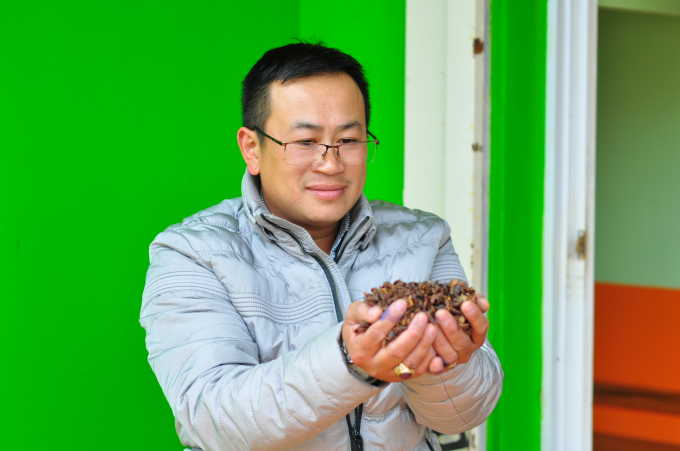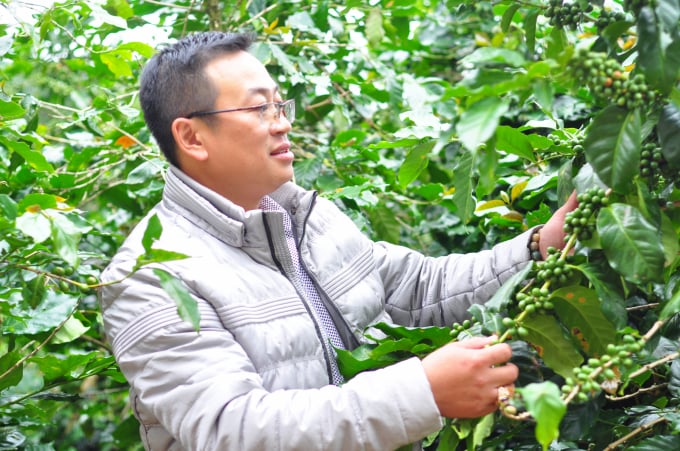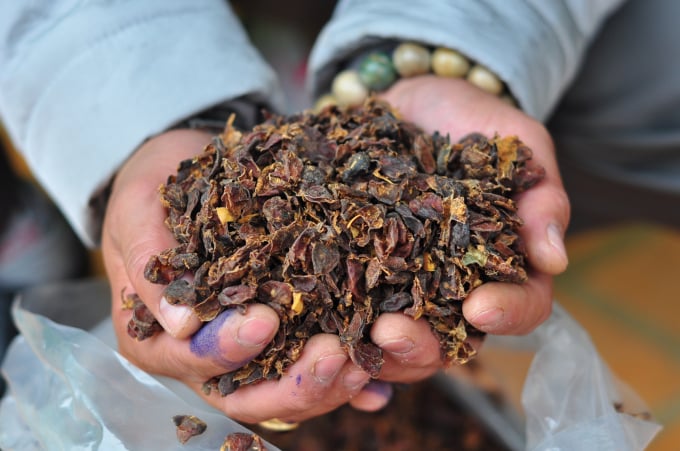May 18, 2025 | 23:01 GMT +7
May 18, 2025 | 23:01 GMT +7
Hotline: 0913.378.918
May 18, 2025 | 23:01 GMT +7
Hotline: 0913.378.918

In recent years, Mr. Nguyen Song Vu has exploited coffee shells to make cascara tea with high economic value. Photo: M.H.
Mr. Nguyen Song Vu, 40, of Xuan Truong commune in Da Lat city, Lam Dong, has become well-known as a pioneer in utilizing coffee shells to produce superior cascara tea.
Born in Lam Dong's traditional coffee-producing area, his life is intertwined with coffee production, and he is always striving to enhance productivity, output, and processing in order to increase the value of his hometown's coffee.
Mr. Vu explains that over the last few years, the price of coffee has steadily decreased, posing a number of issues for producers. As a result, the development of innovative products aimed at increasing the value of coffee are critical.
Regarding the premium cascara tea manufactured from coffee shells, he stated that the husks were previously considered a by-product and were either composted into fertilizer or discarded as trash. In 2016, during a meeting with a Japanese agricultural engineer, he learned that coffee skins may be used to produce cascara tea, a brew that refreshes the spirit and has several advantages to health.
Mr. Nguyen Song Vu became fascinated and began learning about the peculiar tea at the advice of the Japanese engineer.
"I conducted an internet search and discovered that tea produced from coffee shells is quite popular in numerous countries and is a Starbucks hallmark drink in the United States," Vu explained. He began experimenting in 2017 after acquiring knowledge about cascara tea processing.
The 40-year-old farmer said that while purchasing coffee, attention must be taken; only ripe berries at the branch's third and fifth nodes are harvested. As a result, the price of this sort of fresh coffee is higher than the price of bulk coffee.
Cau Dat coffee region (Da Lat) is located at an altitude of 1,600m above sea level and features a moderate environment and fertile basalt soil ideal for Arabica coffee development. As a result, this region has developed into one of the top raw Arabica coffee producing regions in Vietnam and the globe. At the moment, the Cau Dat region contains over 3,000 hectares of coffee with an annual yield of approximately 9,000 tons.
Mr. Vu washes the ripe fruit, ferments it, and then rubs it to extract the ingredients. After that, the coffee shells are moved to the drying stage and subsequently composted. After fermenting the raw ingredients to maturity, they will be dried in the sun under greenhouse conditions to finish the processing step.
Cascara tea manufacturing requires care; neither the fermenting stage nor the sun exposure can be omitted.

Mr. Nguyen Song Vu currently cooperates with many other households to produce coffee and cascara tea. He also popularized the technique of making cascara tea amongst the locals. Photo: Quang Yen.
Song Vu's cascara tea manufacturing has reached success as a consequence of his devotion and meticulousness. He made 100kg of cascara tea during the 2017 coffee season alone. This quantity of merchandise was then given as gifts for everyone to try. He also submits the goods to specialists for quality assurance. The tea is created with carefully picked coffee shells from the world's most famous coffee area, and as a result, he has received great feedback and evaluations from both consumers and professionals.
Mr. Nguyen Song Vu began making cascara tea in 2018 after receiving favorable feedback from users. He stated that after a year of experimentation, he received his first orders, laying the groundwork for him to expand manufacturing to a professional and commodity level.
His family picked and produced half a ton of cascara tea for sale to partners in the 2018 season. By 2019, he had established significant commercial relationships in Hanoi and a network of consumers in other countries. Mr. Vu was also able to sell tea to partners with a consistent amount of 1 ton per year throughout the 2019 and 2020 seasons, despite the market being disrupted by the Covid-19 pandemic.
Mr. Vu states that he is now selling raw cascara tea to his partners for VND130,000 - 150,000 per kilogram. The partner then processes the product with herbs and flavorings, packages it, and sells it to the market for between VND 300,000 and 800,000 per kilogram, depending on the kind.

Cau Dat cascara tea produced by Mr. Nguyen Song Vu has been well received by the market. Photo: M.H.
Mr. Nguyen Song Vu identifies and connects with twelve coffee producers in the region with a total area of approximately 30 ha to secure the input materials necessary to create cascara tea. The transformation of coffee shells into cascara tea has added economic benefits.
Because the output of coffee from these farms is predicted to be lower in 2021 than in previous years, the price of raw materials is likely to be higher than usual. Additionally, the market is greatly impacted by the Covid-19 outbreak, posing problems and hurdles for Mr. Nguyen Song Vu's cascara tea production and distribution.
He is now working to enhance the quality and value of cascara tea products in order to fulfill the demands of domestic and international markets. Following the Covid-19 pandemic, his family will invest in and grow the plant, purchase new machines and equipment for manufacturing, and maintain a strong relationship between product production, processing, and consumption.
The authorities of Xuan Truong commune (Da Lat city) stated that Mr. Nguyen Song Vu's cascara tea is an innovative product that adds value to Cau Dat Arabica coffee. This is a promising approach with significant economic value that should be scaled up. He stated that the community anticipates Lam Dong province launching a promotion campaign to promote cascara tea items to consumers and companies, consequently assisting the Cau Dat coffee area's growth.
Cascara tea products are steeped in boiling water and consumed similarly to fruit teas. Cascara tea is yellow amber in color and has a taste of somewhat sour, sweet flavor. Cascara tea has been shown to improve mood and memory, as well as provide additional energy for a long day. Additionally, this tea assists consumers in improving their health and decreasing their chance of developing illnesses such as diabetes, Parkinson's, and Alzheimer's. Additionally, this beverage is consumed on a regular basis to aid with weight loss and liver protection.
Translated by Linh Linh

(VAN) 14 out of 35 domesticated elephants in Dak Lak province have had their living conditions improved, with 11 of them currently participating in the non-riding elephant tourism model.

(VAN) Muong Nhe Nature Reserve hopes that being upgraded to a national park will lay the foundation for forest protection efforts to be carried out in a systematic, modern, and sustainable manner.
/2025/05/16/3923-2-171845_52.jpg)
(VAN) Lower costs, higher yields, and improved soil quality are outstanding benefits that soybeans bring when integrated into the crop rotation system.

(VAN) The 'For a Green National Environment' programme aims to promote a green lifestyle, support businesses in implementing ESG practices, and turn Net Zero commitments into concrete actions.

(VAN) Cold-barn systems efficiently manage environmental and temperature conditions, which aids in the prevention of respiratory diseases in pigs and protects them from the vectors that transmit African swine fevers.

(VAN) To tackle challenges, the project 'Addressing key technical bottlenecks in the grouper supply chain in Vietnam' has been underway since 2024.

(VAN) The project 'Disease-Resilient and Sustainable Cassava Production Systems in the Mekong Region', funded by the Australian Center for International Agricultural Research (ACIAR), is being implemented from 2024 to 2028.